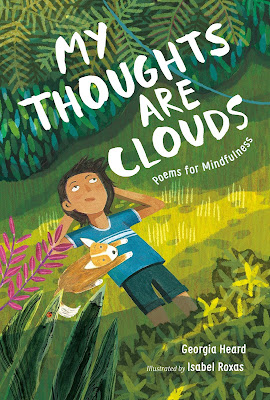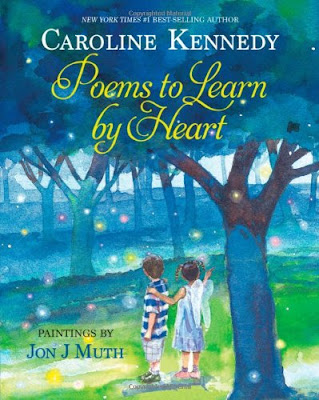This is Just to Say: Poems of Apology & Forgiveness
Bibliography:
Sidman, Joyce and Pamela Zagarenski. This is Just to Say: Poems of Apology and Forgiveness. Boston: HMH Books, 2007. ISBN: 0544105079Plot Summary:
 When Mrs. Merz’s sixth grade class reads “This is Just to Say” by William Carlos Williams, they become inspired to compose their own collection of apology poems. The first half of the book features a mixture of humorous and heartbreaking apologies on topics ranging from dodgeball, stolen doughnuts, and broken windows, to grief at the loss of beloved pets, confessions of betrayal, and even a devastating apology to a father who had left his daughter behind. Each poem is dedicated to its wronged party: mothers, friends, brothers, teachers, and deceased animals, to name a few. The second half of the book features response poems, mostly from the apologies’ intended audience but sometimes from other writers when the offended individuals couldn’t (or wouldn’t) respond. Their replies vary as widely as the apologies themselves: humorous twists, blunt refusals, and heartwarming expressions of empathy and forgiveness.
When Mrs. Merz’s sixth grade class reads “This is Just to Say” by William Carlos Williams, they become inspired to compose their own collection of apology poems. The first half of the book features a mixture of humorous and heartbreaking apologies on topics ranging from dodgeball, stolen doughnuts, and broken windows, to grief at the loss of beloved pets, confessions of betrayal, and even a devastating apology to a father who had left his daughter behind. Each poem is dedicated to its wronged party: mothers, friends, brothers, teachers, and deceased animals, to name a few. The second half of the book features response poems, mostly from the apologies’ intended audience but sometimes from other writers when the offended individuals couldn’t (or wouldn’t) respond. Their replies vary as widely as the apologies themselves: humorous twists, blunt refusals, and heartwarming expressions of empathy and forgiveness.Critical Analysis:
Joyce Sidman crafts the voices of her fictitious characters so masterfully that readers will find themselves fully embracing their authenticity. The conceit is so completely rendered as to include an introduction from a student editor “Anthony K.” with an explanation of the book's creation as a class project. Editor’s notes accompanying selected poems contribute to the project’s sense of verisimilitude.The styles of the poems are as diverse as their authors. Mrs. Merz responds to an apology from Carmen (who had made a cruel joke about her teacher’s outfit) by writing a simple haiku of forgiveness ending with a line of beautiful imagery: “my dress turns to sky.” Although rhyme is scarce, refreshing turns of phrases appear on every page of this delightful book. Kyle and Reuben, two boys who each write apologies for slamming each other too hard in dodgeball, compose a response poem for two voices entitled “Dodge Ball Kings.” A perfect opportunity for onomatopoeia (“zing, bam, sting!”), the poem’s metaphors pack as much punch as a real dodgeball to the face: “a catapult / a cherry bomb / a setting sun / a blazing ring / we fire / through the air.” Readers will feel the excitement and gleeful reconciliation of these two kings of dodgeball.
Perhaps some of the most emotionally compelling poems in the collection are apologies written to parents, accompanied by the parent’s reply (or lack of reply). When José’s dad attempts to write a poem in response to José’s apology for breaking the garage window, his dad ends up confessing that he was never good at school and that he doesn’t know how to write a poem. Although the writing is less poetic and polished than the other poems in the book, the simple style and awkward line breaks only serve the effect, a sincere expression of pride for his son: “I couldn’t be prouder and somehow I’ve written this poem if you could call it that…”
Another parent poem (written in pantoum form) expresses Anthony’s deep shame for losing a spelling bee and watching his mother turn away in disappointment: “I never seem to be your champion.” In its matching response poem, a student named “Tenzin” writes back to Anthony because, as it notes at the bottom of the page, Anthony’s mother said he was being "ridiculous” and declined to write a poem to her son.
Sidman does not shy away from difficult emotions in this book. The fantastic, whimsical, mixed-media illustrations by Pamela Zagarenski complement each poem, but at first glance they mislead the reader into thinking that the book is all fun and games. Zagerenski uses materials found in the classroom like notebook paper, graph paper, crayons, paint, and cut-out dictionary entries. The crafty, childlike illustrations of Einstein the dog, with his tiny wings and golden crown, do not prepare the reader for the ending of the poem about the difficult choice of putting his beloved dog to sleep: “Is death ever right? I don’t know, but I hated having to choose it. And I hate the quiet in our house without you.” Anyone who has lost a pet or a loved one knows this terrible feeling.
What Joyce Sidman has created in this collection is a poignant, sophisticated (though accessible) exploration into the themes of apology and forgiveness surrounding some of life’s big questions and heartaches. Young readers, as well as adults, will find humor, truth, and comfort in these beautiful works of art.
Awards and Review Excerpts:
- Claudia Lewis Poetry Award 2007
- Cybils Poetry Award
- Lee Bennett Hopkins Poetry Award Honor Book
- School Library Journal Best Book of the Year
- IRA Teacher's Choice Book
- New York Public Library's "100 Titles for Reading and Sharing"
- Book Links Lasting Connection Book
“Whimsical, wise, and all worth reading, these poems, written in the voices of fictional sixth-grade students and their teacher, speak volumes about the nature of forgiveness, sincere and otherwise.” School Library Journal
Connections:
Invite students to write, illustrate, and share their own apology poems.Perform the theatrical adaptation of This is Just to Say:
Bond, Juliet. This is Just to Say. Cedar Rapids: Brooklyn Publishers, 2012. ISBN: 9781600036675
Collect other works by Joyce Sidman:
Dark Emperor and Other Poems of Night. Boston: HMH Books, 2010. ISBN: 0547152280
Red Sings from Treetops: A Year in Colors. Boston: HMH Books, 2009. ISBN: 9780547014944
What the Heart Knows: Chants, Charms, and Blessings. Boston: HMH Books, 2013. ISBN: 0544106164



Comments
Post a Comment